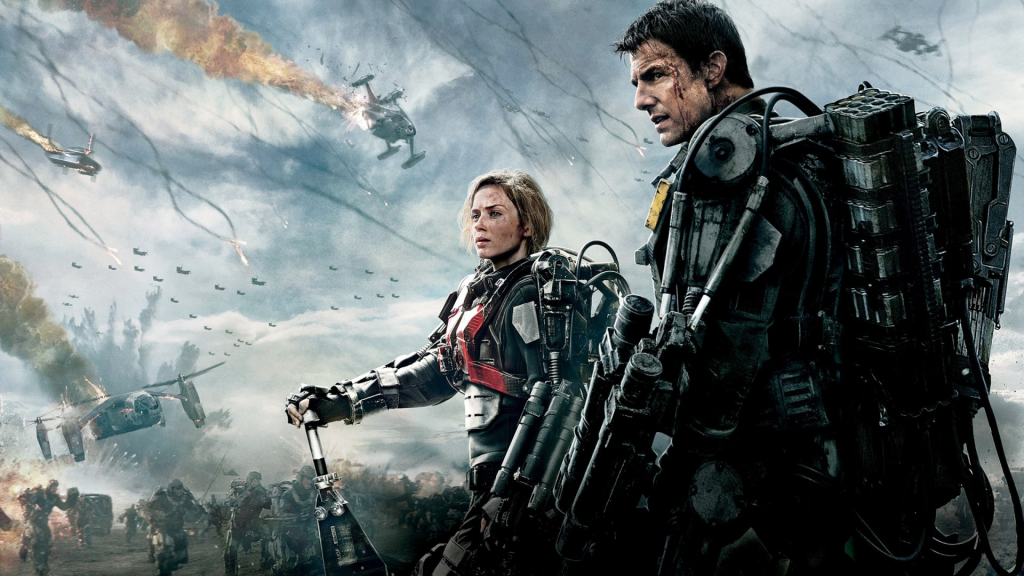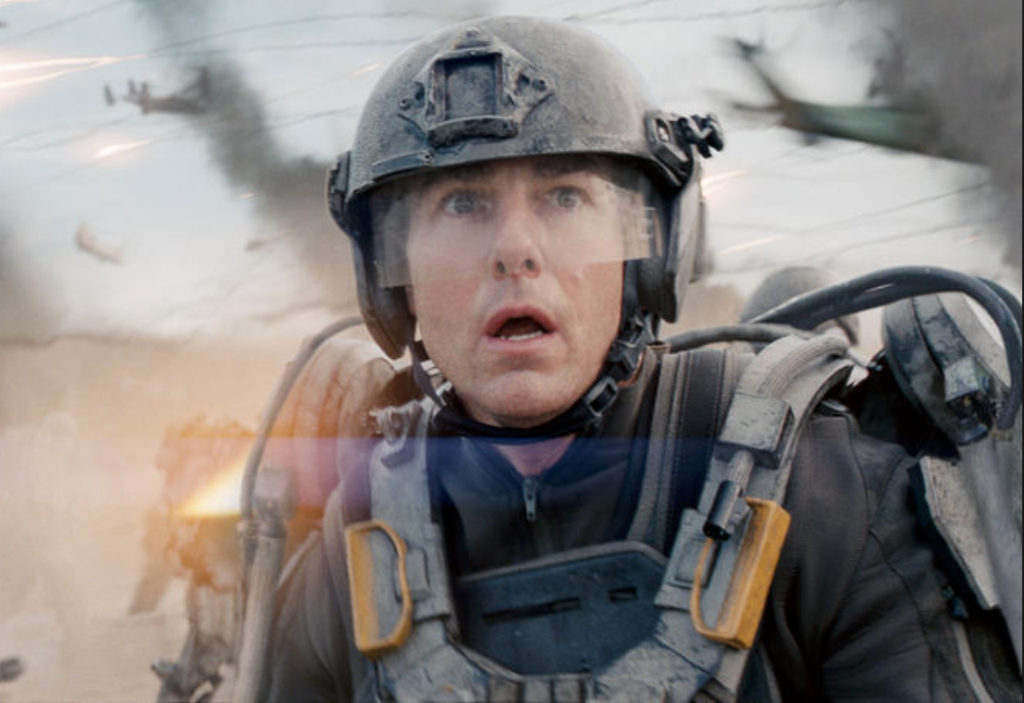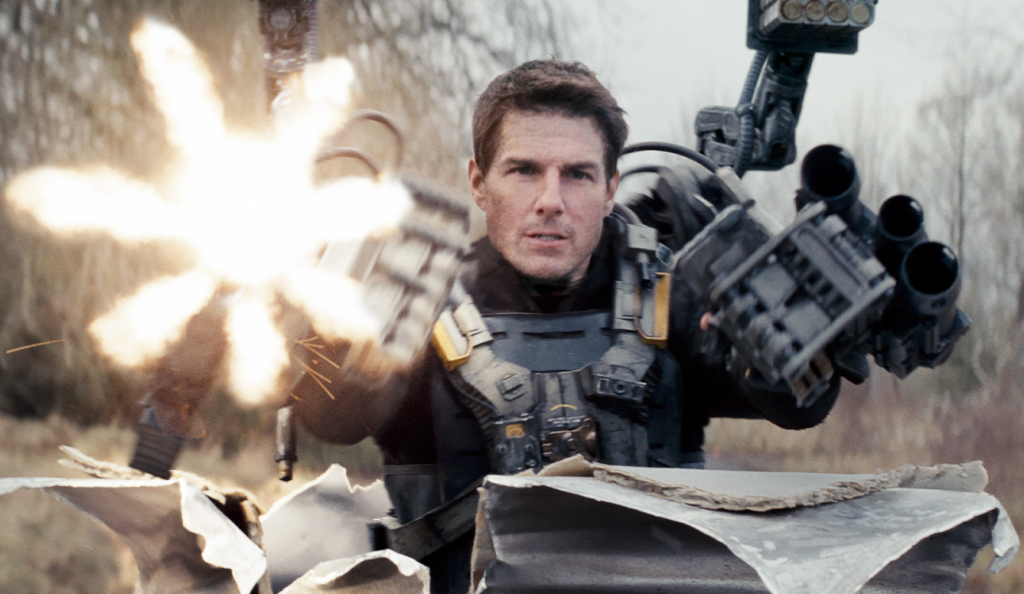Today I take a second look at a movie that has slowly and quietly become a sci-fi classic.
There is no movie in recent years that has gained more fans after underperforming at the box office than Edge of Tomorrow. I can tell you from personal experience that no fewer than a dozen people (many of them casual moviegoers – not industry types) have said to me, unprompted, a variation of, “You know what’s a great movie that nobody knows about? Edge of Tomorrow.”
When Edge of Tomorrow first came out in script form as a million dollar spec-sale slash adaptation (its original title was “All You Need Is Kill”), I loved it. But the second Tom Cruise came on board, I was confused. The script’s main character was 18, and much of the story was built around the fear you have as an ignorant young soldier. Tom Cruise was 50+ when he was cast. That’s a huge change. How, I wondered, is this going to work after you take away one of the defining elements of the story?
It turns out it didn’t work. Or, at least, it didn’t work for me. In this new iteration, Cruise was a veteran officer who was inexplicably forced to become a soldier. Why? I’ll tell you why. BECAUSE THEY NEEDED A MOVIE. It made zero sense and I never got past it. The entire movie was built off of artificially constructed writer logic to get our way-too-old main character into the same situation that the original, 18 year-old, character had been in. To me, that’s when the movie ended. When it sold logic down the river.
But clearly, others weren’t bothered by this. In fact, I’d guess that if you polled 100 average moviegoers who saw this film, not one of them would’ve brought up this problem. And this speaks to the analysis mindset myself, executives, producers, and agents are obsessed with. You see, we know how difficult it is to get a movie made. We know that the more things that are in place, the better the chance is that the movie will be produced. Therefore, when we see a glaring error like a character who would never be in this situation being placed in this situation, we tell the writer, “You need to change this or else.”
But to an audience member, this makes all the sense in the world. It’s Tom Cruise. OF COURSE he’s going to have to fight. What are you going to do? Have him sit in an office the entire movie? They don’t care how Tom Cruise gets on the battlefield. As long as he gets on the battlefield.
So where’s the disconnect here? Why is it that I get all up in arms about this and won’t accept the movie after the choice is made, yet the people who made the film and the people who watch the film had no problem with it at all? The answer is complicated and comes down to the process a script goes through and how what may be important in one step will not be important in another.
When you’re writing a spec script, it’s crucial you get this kind of plot beat right. Remember, your movie is not getting made at this point. You’re a nobody with words on a page. Therefore, every single beat of your screenplay – in particular the pillar beats, the ones that hold up your story – will be scrutinized. This is why in the original All You Need Is Kill, we have a young scared soldier. Because that’s consistent with the reality of young men getting drafted into war.
However, once your script reaches the “Actor Attached” stage, it’s less about logic and more about getting things as good as you can get them by the time the cameras start rolling. The film is getting made whether you solve the “50 year old dude gets drafted into the army” problem or not. So you do the best you can do, knowing that the audience isn’t going to be as discerning as the script reader who needs things to be as logical as possible to recommend the script to their boss and not get yelled at.
It’s one of the trickier realities about screenwriting – that the same rules don’t apply across the board. While this can be confusing, it’s important to remember that when you’re on the bottom rung and your script needs to stand on its own, plot beats like this have to make sense. You don’t get the “we’re making this movie whether we solve this problem or not” leeway.
This is a long way of saying I wanted to give this film another shot. I want to remove the internal script analyst in me and try to enjoy this film as the 2 hour shot of entertainment adrenaline it became for so many others. And I feel like I have enough distance from the film and its script to do that. With that in mind… what did I think?
For those who’ve forgotten, Edge of Tomorrow follows a public relations officer, Cage, who, due to the escalating nature of an alien invasion, is forced to become an on-the-ground soldier. When Cage is killed during a D-Day attack on a beach, something happens that sends him into a time loop. Every time he dies, he wakes up at the beginning of the day again. This allows him to master the art of battle through repetition, kind of like a video game. Along the way, he meets Rita, a young woman who had the same power as him, but who’s since lost it. Rita uses her knowledge to help Cage find and destroy the mother alien.
Okay!
So what did I think??
You know what. This screening was DEFINITELY better. Way better than I expected. And that surprised me. I was fully ready to feel the same way about the film. The opening still bothers me (in addition to Cage’s age, why are we putting a man in a 5 million dollar suit he’s never trained in before then throwing him into battle an hour later?), but I zen-meditated through it all and focused on the other aspects of the story that did work.
Speaking of, I noticed that the Groundhog Day-like time-looping device was so fun, it helped divert attention away from the script’s weaknesses. I had to remind myself that while I knew the time jumping was coming (because I read the script), the people who skipped this movie in theaters and stumbled onto it on digital were likely shocked when Tom Cruise died in the first fifteen minutes, only to be reborn again. That was the hook point, and once it happened, nobody was thinking about whether a 50 year old would be an army grunt.
The script also handles exposition and plot development much better than I remember. The mythology of the Scourge (the invading alien species) is complex, with a hierarchy of alien fighters, several of which (Alphas) carry an “antennae” feature that allows them to see into the future and direct the army so that the Scourge can always predict the humans’ next move. When Cage kills an Alpha and the blood covers him, he inherits the same power.
It’s far-fetched when you think about it, but in an early exposition scene, a doctor character lays out all of this very simply. As a result, I was never confused about what was going on. That’s a major level-up as a screenwriter – when you can take complex mythology and explain it simply. It’s an art to know just how much information you need to give the reader and not a letter more. And the writers here nailed it.
The script also fixes a loophole that has doomed many a time travel script in the past: non-existent stakes. Remember, whenever a character travels in time and fails, he can just go back in time and try again. This is one of the reasons The Terminator series can’t be revived, despite attempts to do so every five years. We know if the Terminator fails to terminate… they can just send another one. So where are the stakes?
One of the cooler script choices in Edge of Tomorrow is when Officer Cage loses his power before he’s accomplished his goal – to find and kill the future-transmitting alien. Remember, up until this point, he has a safety net (the loop), allowing him to test new things every day. But when that power is all of a sudden gone, the stakes are sky high. He doesn’t get any more lives. Knowing he couldn’t screw up even once in the final act made for a really tense finale.
There are still some things that bother me, such as the fact that we spend the entire first half of the movie trying to bust through the defending Scourge on the beach. However, once they accomplish this, they’re inexplicably able to freely drive a truck down long stretches of country highway. Seeing as we’re on a landmass as giant as Europe, wasn’t there an easier way to get to this highway than through a beach full of killer aliens?
And yes, it still bothers me that there is literally NO reason for why Officer Cage is sent to the front line. They don’t even try to come up with an explanation. The Commander just says, “I’m sending you to the front line,” and that’s it, lol. BUT, at least this time around, I didn’t let it get in the way of the rest of the story. And I’m glad, because if you let that go, you realize that Edge of Tomorrow is a damn good movie.
What I learned: LEVEL UP BY CONSOLIDATING EXPOSITION – One of the most important skills a screenwriter can possess is the ability to take complex mythology and/or plot elements, and distill them down to short and clear exposition passages. Most amateur writers view exposition as information that needs to be conveyed, regardless of length. Instead, they need to see exposition as information that needs to be consolidated.







